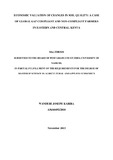| dc.description.abstract | Compliance with agri-regulation mechanisms like GLOBALGAP has been extensively studied with some studies focusing on the non-market benefits of smallholder compliance. Some of these have found that there are quantifiable health benefits that accrue to compliant farmers while others allude to possible environmental benefits of smallholder compliance with agri-food standards. This study focuses on this research gap and empirically analyzes economic values of changes in soil quality (an environmental attribute) as a result of compliance with GLOBALGAP standards in producing and marketing fresh vegetables for export under different compliance arrangements. Using the replacement cost and the contingent valuation economic valuation approaches, the study estimated the direct and total economic value of changes in soil conditions given the farmers compliance with GLOBALGAP standards. The study further utilizes the ordinary least squares regression approach to analyze the factors that influence the economic value of changes in soil quality.
The estimation of direct economic value of changes in soil quality is undertaken in only one of the study clusters i.e. Kirinyaga due to a resource and time constraint. Estimation of total economic costs is undertaken in three study clusters i.e. Kirinyaga, Mbooni and Buuri in Central and Eastern Kenya. Direct economic values are estimated at Kshs 2,462 and Kshs 2,666 for the compliant and non-compliant farmers respectively. Total economic values of changes in soil quality are estimated atKshs 2,621, Kshs 2,611 and Kshs 2,743 for compliant farmers in Kirinyaga, Buuri and Mbooni respectively. The estimated economic values of changes in soil quality for the non-compliant farmers are Kshs 1,993, Kshs 2,066 and Kshs 2,216 in Kirinyaga, Buuri and Mbooni respectively. Divergence in the direct and total economic values is attributed to the different methodologies, study areas and other factors considered in estimating the direct and total economic values of changes in soil quality.
Consistent with past studies, income has a significant and positive influence on the household’s stated willingness to pay for changes in soil quality. The farmers’ compliance status, the households’ ownership of livestock, transport costs to the nearest urban centres, importance attached by the respondent to the hypothetical scenario posed, the gender of the household head and the respondent being from Mbooni are the other factors that were found to have a significant effect on the stated total economic value of changes in soil quality.
The study’s value to agri-regulation policy is in the finding that agri-regulation benefits also benefits farmers in addition to consumers who have been the primary concern for such regulations. Farmer benefits include savings in health expenditures as found in other studies as well as environmental benefits. | en_US |

